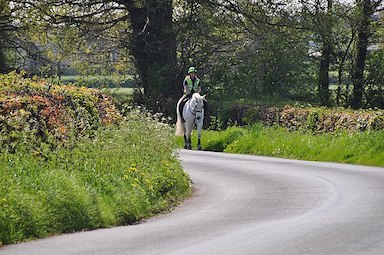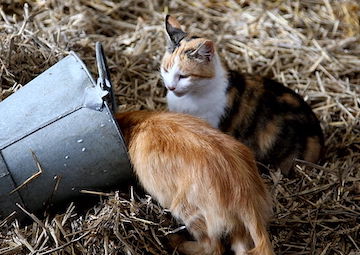Two farm cats, drinking milk from a bucket.
Worksheet No. 14
These Worksheets are based on textbooks written by NL Clay (1905-1991) and used in English schools from the 1920s to the 1960s. They focus on vocabulary, sentence structure, and clear speaking. They are best studied in pairs or small groups, because that allows you to pool ideas and encourages you to speak; but you may of course share your sentences with me.
Composition
For each group of words, compose a single sentence that uses at least one of them. They are generated randomly from a list of very common English words.
I. Avoid. Fill. Opportunity.
II. Still. Fire. Wish.
III. Return. Third. Student.
See more Spinners.
Vocabulary
“Jack? Oh, he’s ___________.” What do we learn about Jack from these nouns?
IA die-hard. IIA gourmand. IIIA highbrow. IVA liability. VA plodder. VIA pushover. VIIA recluse. VIIIA stoic. IXA sycophant. XA timeserver. XIA turncoat. XIIAn introvert. XIIIAn upstart.
1He is shy and does not display his emotions. 2He rarely goes out and rarely meets others. 3He has switched sides in a dispute. 4He behaves like one who won’t risk his pension by standing up to the boss. 5He does whatever he can to flatter and please someone he thinks is important. 6He holds a position higher than his experience merits. 7He prefers things that are fashionable among intellectual people. 8He is easily persuaded. 9He enjoys seeking out food and drink of the best quality. 10He bears disappointments or ill-treatment without complaint. 11He will defend his cause whatever it may require of him. 12He lacks imagination in his work. 13He is likely to prove damaging to his own side.
Expansion
Rewrite each sentence such that the meaning is unchanged but it is at least twice as long as the original.
NB A good way to begin is to use a clause with several words in it instead of the single word in italics. The words ‘who’, ‘which’ and ‘that’ may prove very useful!
For example
My meticulous preparations were all for nothing. (7)
The preparations on which I had lavished so much care and attention were all for nothing. (16)
1. An expensive vase lay broken on the floor. (8)
2. A reckless man should not be a surgeon. (8)
3. He told an incredible tale. (5)
4. I felt an unseen enemy was watching me. (8)
5. His spontaneous speech gripped the audience. (6)
6. Is there such a thing as an untrodden path? (9)
Punctuation
Add suitable punctuation to the three sentences below. Please note that there isn’t necessarily one ‘right answer’ to this, though there may be several wrong ones. The first two sentences are taken from verse.
1. will you walk into my parlour said a spider to a fly tis the prettiest little parlour that ever you did spy
2. heavn has no rage like love to hatred turnd nor hell a fury like a woman scornd
3. im not one o those as can see the cat i the dairy an wonder what shes come after
1. “Will you walk
into my parlour?” said a spider to a fly:
“’Tis the prettiest little parlour that ever
you did spy.”
[Mary Howitt]
2. Heav’n has no rage,
like love to hatred turn’d,
Nor Hell a fury, like a woman scorn’d.
[William Congreve]
3. I’m not one o’ those as can see the cat i’ the dairy, an’ wonder what she’s come after. [George Eliot]
Narration
Turn these notes into a short passage of continuous prose.
Once upon a time... Thirsty crow. Pitcher. Very little water in it. Crow can’t reach water. Tries to knock pitcher over. Fails. Thinks. Drops pebbles in. Water level rises. Crow can now drink water. And the moral of that is...
Based on The Crow and the Pitcher by Aesop.
Elocution
Speak each group of words out aloud, making the difference in pronunciation clear.
IKnow, now. IIWise, wife. IIIWho, chew. IVFool, pool. VShun, sun. VITeach, touch. VIIWake, rake.
Read this short passage out aloud, clearly and without haste. Make careful use of emphasis, pauses and tone of voice.
He who knows, and knows that he knows,
Is wise; follow him.
He who knows, and knows not that he knows,
Is asleep; wake him.
He who knows not, and knows not that he knows not,
Is a fool; shun him.
He who knows not, and knows that he knows not,
Is a child; teach him.
Anonymous, developed from a Persian proverb found in The Revival of the Religious Sciences by Al-Ghazali (?1058-1111).














